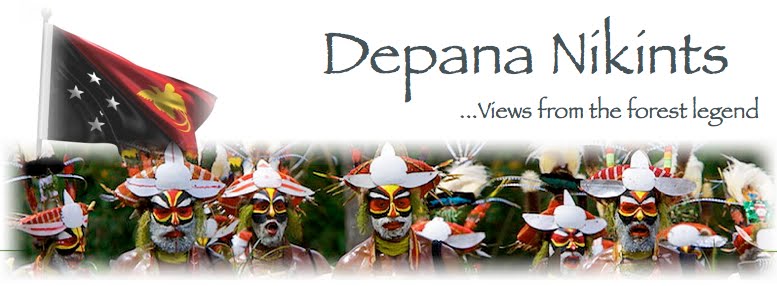The Melanesian struggle to maintain customary ownership and control of land is very phenomenal. To the Melanesian, land is the center of life. It has a holistic value, and not just economics. The Western perspective of land is economical because they see everything centered around money. Unfortunately, money floats around in the hands of a few capitalists who see the world cycling around them. No wonder there are a lot of money out there but there is so much, starvation and hunger, shortage of medicines and poverty.
This brings the question, is there an alternative to this failing system? Yes - the indigenous systems like the Melanesian system have been working for thousands of years and have proven over time to sustain indigenous communities. Indigenous systems see life in a complete circle and everything is attached and connected. The western model is a total failure, yet it is very popular and those who live off this system drive a propaganda globally as the only way forward.
Land is central to the Melanesian as it sustains and produce life. People in Melanesian who do not have a constant income get all their livelihoods from their land. Land is the biggest employer because over 85% of the population in countries like Vanuatu and PNG dwell on their land.
The Australian Government through its funding agency, AusAid is financing land development programs in the Pacific - Making Land Work. The Australian Government claims to have no interest in land development in the Pacific, yet it is pumping millions of dollars of Australian tax payers money into the Pacific lands program. Australia is also in the engine room of the Pacific Trade Agreements such as PACER Plus, and it is an interesting coincidence that it is pumping millions into land development programs and claims to have no agenda.
The land development programs in the Pacific is to access more customary land for development purposes through customary land registration processes.This process supports policies of customary land conversion in the Pacific and therefore a dangerous process. It is dangerous process because it facilitates policies that will make people landless, lose their security and fragment the communal structure and clan system that is fundamental to Melanesian survival. It is dangerous because it will cause more problems than solutions and millions will be affected in the benefit of few corrupt elites and those on the top of the ranks of the capitalist strata.
The consequences of the Pacific land development program will be devastating. The governments and the financier of these Policies in the Pacific are waging war on indigenous people of the pacific. This must be seen as a war because it will result in escalation of poverty, destruction of social structures, cultural and traditional values.This must be seen as a war because it will affects millions of life at the expanse of a few corrupt elites and multi-national corporation. Policies like these that will create more problems than solutions should be regarded and categorized as weapons of war.






